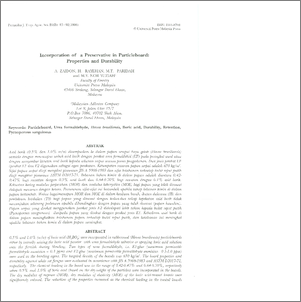Citation
Ashaari, Zaidon and Hamid, Rayehan and Md. Tahir, Paridah and Mohd Yunus, Nor Yuziah
(1998)
Incorporation of a Preservative in Particleboard: Properties and Durability.
Pertanika Journal of Tropical Agricultural Science, 21 (2).
pp. 83-92.
ISSN 1511-3701
Abstract
0.5% and 1.0% (w/w) of boric acid (H3BO3) were incorporated in rubberwood (Hevea brasiliensis) particleboards
either by initially mixing the boric acid powder with urea formaldehyde adhesive or spraying boric acid solution
onto the furnish during blending. Two types of urea formaldehyde, i.e. E1-glue (maximum permissible
formaldehyde emmision < 0.1 ppm) and E2-glue (maximum permissible formaldehyde emmision 0.1-1.0 ppm)
were used as the bonding agent. The targeted density of the boards was 650 kg/m3
. The board properties and
durability against white rot fungus were evaluated in accordance with JIS A 5908-1983 and ASTM D2017-71,
respectively. The chemical loading in the board was in the range of 0.42-0.47% and 0.64-0.70%, respectively
when 0.5% and 1.0% of boric acid (based on the dry-weight of the particles) were incorporated in the boards.
The dry modulus of rupture (MaR), dry modulus of elasticity (MOE) of the boric acid-treated boards were
significantly reduced. The reduction of the properties increased as the chemical loading in the treated boards increases. However, wet MOR and wet MOE, internal bonds (IB) and thickness swelling (TS) of treated boards
at both concentration levels did not differ significantly compared to the untreated boards. Particleboards bonded
with E2-glue were more resistant to white rot Jungus (Pycnoporous sanguineus) than those bonded with El-glue.
The presence of boric acid significantly increased the durability of board against white rot Fungus, and the
resistance towards the Fungus increased as the boric acid loading increases.
Download File
![[img]](http://psasir.upm.edu.my/style/images/fileicons/application_pdf.png)  Preview |
|
PDF
Incorporation_of_a_Preservative_in_Particleboard.pdf
Download (4MB)
|
|
Additional Metadata
Actions (login required)
 |
View Item |

